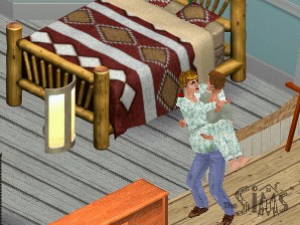Wednesday 23 October 2002

|
Pic of the day: Among adults, there is a fine line (if any) between love and lust much of the time. This is as it should be, I think. (Screenshot from The Sims.) Love definedI have concluded that "love" is simply a name for the positive feelings generated by our reproductive instincts. By extension the same word is used in English for liking things in general, but this is an imprecise use. I shall therefore ignore this fringe use of the word. There are two types of love: Sexual love and parental love. Sexual love is intense but temporary. Its function is to make acceptable the discomfort of compromising, breaking habits, moving, taking risks, all the discomfort that follow from acquiring a life mate. It is certainly possible to procreate without all this, but historically it was needed for ensuring successful breeding and the subsequent raising of offspring. Parental love is more durable, and enables you to live comfortably with the daily sacrifice of having parasites exploit you for much of your life. If not for this, the human race would be lost quickly. Of course there are also social conventions about not throwing the baby out with the bath water, but loving the little stinkers makes it easier. ***For various reasons, love can be diverted from its original function. I am not just thinking of homosexuals and such, though that's certainly a good example. They are way off the track, biologically speaking; but their experience of love doesn't seem much different from anyone else. (Well, anyone else to whom 95% of possible love objects are unavailable even when not taken.) A more common and less drastic case is the diversion of parental love. As in many mammals, it is fairly easy to bond with other babies (as in adoption) but also babies from other mammal species, as in pets. Many people, especially adults who don't have children, actually love their dog or cat deeply. They will talk to the animal, care for it without expecting anything in return, worry when it is sick and grieve deeply when it dies. Given that modern cats and dogs don't even catch rats, it is clearly a case of parental love displaced. ***I think that is basically all there is to it. Some scientists believe altruism is generally derived from the same set of instincts, but I dispute that. Not all things have a clear-cut sociobiological reason. You can't say that some people are nice because it's an instinct and others are jerks because it's an instinct. Some people just latch on to a pattern of behavior and grow in that direction. But behaviors that are almost universal is another matter. And love is two such. Notice that I write nothing about a child's love for its parents. Because children don't love their parents. They depend on them, physically and emotionally, and this certainly induces a closeness. But it is not love. That is not to say that children won't grow up to feel thankful or at least guilty and eventually sacrifice something for their parents, if they need to. And the emotional bond may last throughout life, not that I'm saying that is a good thing. But love is more than familiarity. It is an inner drive that makes it easy (or at least easier) to sacrifice yourself for another in daily life. People in love and healthy parents do this rather casually, but offspring do it out of obligation, gratitude or guilt, not as a primal need. Similarly, I'll cheerfully ignore religious love. I notice that in Christianity, there's not even used the same word originally. I fully agree with this. In conclusion then, there is no need to love or be loved unless you intend to have children. It is certainly possible, but it lacks its original meaning. Much like an exercise bike that doesn't go anywhere, just stands there spinning. |
Rain, 50% more than the previous record of rain. |
Yesterday <-- This month --> Tomorrow?